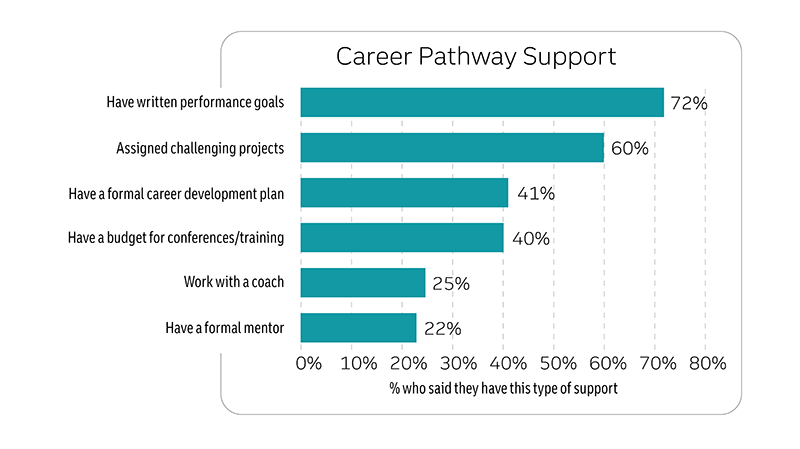Written by Cheryl Flink, Ph.D., Director of Research
New research conducted by Truist Leadership Institute found that creating supportive Talent Development Cultures significantly increases employee engagement, likelihood to stay, and purpose-driven work. The ability to create highly engaged, enthusiastic employees who accelerate organizational success partly depends on how leaders nurture employee development.
What can leaders do to create an effective Talent Development Culture? Begin by focusing on the fundamentals for building career pathways.
Over 1,200 U.S. employees completed a survey regarding how their organizations support employee growth and development. We presented research participants with a list of six potential items related to defining and supporting progression on career pathways.

72% of participants indicated they had written performance goals. Understanding how your performance will be evaluated and compensated is fundamental to career development. Unfortunately, 28% of survey participants lack that clarity. A formal evaluation process must be in place with guidance on how to create performance goals and conduct annual reviews.
59% of participants lacked a career development plan. When leaders take time to understand individual employees’ goals and aspirations, leaders can shape growth opportunities, including skills-based training, leadership development, and the assignment of stretch projects. Although stretch projects are proven to have an enormous impact on employee growth, 40% of research participants indicated they do not receive these opportunities. Part of career development also includes fostering ways for employees to get outside-in perspectives through conferences or other specialized training. About 40% of our research participants say their organizations provide this support.
Finally, staying on the right career development pathway requires support—but our research shows that only about a quarter of our participants have access to coaches or mentors. Research has proven mentoring can be an effective tool for employee career development, reduce burnout, and increase organizational commitment.
In a Talent Development Culture, all leaders should feel a responsibility for helping employees design and implement career pathways that support both their employees’ aspirations and the organization’s future talent needs. These six fundamentals can help you and your employees envision and activate career pathways that engage and retain critical employees who deliver their purposeful work for your organization’s success.
Connect with a Truist Leadership Institute Business Advisor.